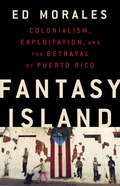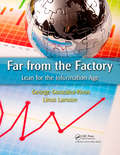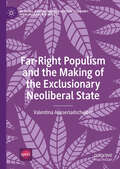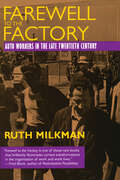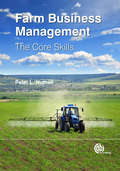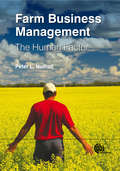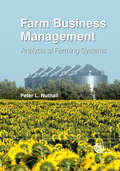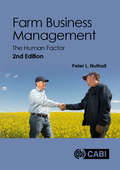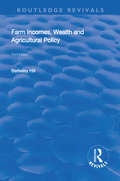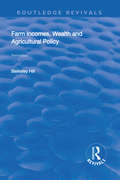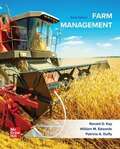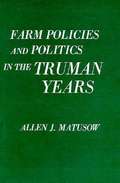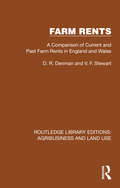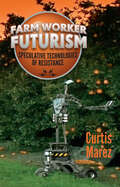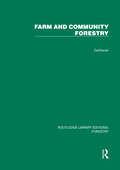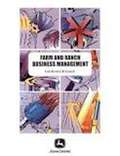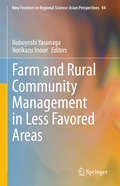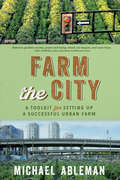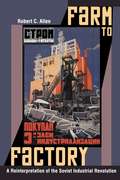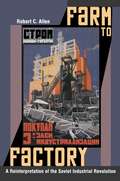- Table View
- List View
Fantasy Island: Colonialism, Exploitation, and the Betrayal of Puerto Rico
by Ed MoralesA crucial, clear-eyed accounting of Puerto Rico's 122 years as a colony of the US.Since its acquisition by the US in 1898, Puerto Rico has served as a testing ground for the most aggressive and exploitative US economic, political, and social policies. The devastation that ensued finally grew impossible to ignore in 2017, in the wake of Hurricane María, as the physical destruction compounded the infrastructure collapse and trauma inflicted by the debt crisis. In Fantasy Island, Ed Morales traces how, over the years, Puerto Rico has served as a colonial satellite, a Cold War Caribbean showcase, a dumping ground for US manufactured goods, and a corporate tax shelter. He also shows how it has become a blank canvas for mercenary experiments in disaster capitalism on the frontlines of climate change, hamstrung by internal political corruption and the US federal government's prioritization of outside financial interests.Taking readers from San Juan to New York City and back to his family's home in the Luquillo Mountains, Morales shows us the machinations of financial and political interests in both the US and Puerto Rico, and the resistance efforts of Puerto Rican artists and activists. Through it all, he emphasizes that the only way to stop Puerto Rico from being bled is to let Puerto Ricans take control of their own destiny, going beyond the statehood-commonwealth-independence debate to complete decolonization.
Far from the Factory: Lean for the Information Age
by Linus Larsson George Gonzalez-RivasIf you currently employ knowledge workers who do most of their work on computers or with computers, access the Internet, utilize internal and external databases, use e-mail or other new messaging technology, then this book is for you. Quite simply, this handbook is for any organization with a lot of Web DNA that wishes to cut costs, improve perform
Far-Right Populism and the Making of the Exclusionary Neoliberal State (Building a Sustainable Political Economy: SPERI Research & Policy)
by Valentina AusserladscheiderThis book examines the rise of exclusionary neoliberalism by assessing how far-right populist actors impact economic policy change. Drawing on the case of the Austrian Freedom Party, the book illustrates how neoliberalism emerged as a far-right political project in Austria. Tracing the Freedom Party´s ideational history, the book describes the making of the exclusionary neoliberal state through its establishment in the 1980s, its implementation in the early 2000s and how exclusionary neoliberalism was sustained after the Great Financial Crisis of 2008. The book thereby provides important insights on how domestic politics respond to challenges imposed by globalization and international market integration, and explains the less obvious ways in which exclusionary nationalist ideas can be deeply entangled with neoliberalism. The book will appeal to all those interested in far-right populism and its interrelation with political economy.
Farb- und Formpsychologie
by Tobias C. BreinerDieses Werk ist eine umfassende und praxisrelevante Darstellung zur Farb- und Formpsychologie. Mit einer klaren Sprache und über 100 farbigen Abbildungen wird Ihnen die komplexe Thematik auf eine wissenschaftliche und anregende Art veranschaulicht.Über eine allgemeine Einführung in die Grundlagen des visuellen Systems hinaus werden Sie ebenfalls spezielles Wissen zu Assoziationen, Wirkungen und Anwendungen bestimmter Farben und Formen erwerben. Speziellen Wert legt der Autor dabei auf deren Einsatz im Game Design. Es wird zudem erstmals eine neue Farbstudie präsentiert, die zeigt, dass die Assoziationen zu Farben sich in einem in sich logischen dreidimensionalen System anordnen lassen. Die daraus gezogenen überraschenden Erkenntnisse liefern mögliche Antworten auf fundamentale Fragen der Philosophie. Das Buch ist daher nicht nur ein Muss für Wahrnehmungspsychologen und Designer, sondern eine Bereicherung für alle an dieser Thematik Interessierten.
Farewell to the Factory: Auto Workers in the Late Twentieth Century
by Ruth MilkmanThis study exposes the human side of the decline of the U.S. auto industry, tracing the experiences of two key groups of General Motors workers: those who took a cash buyout and left the factory, and those who remained and felt the effects of new technology and other workplace changes. Milkman's extensive interviews and surveys of workers from the Linden, New Jersey, GM plant reveal their profound hatred for the factory regime—a longstanding discontent made worse by the decline of the auto workers' union in the 1980s. One of the leading social historians of the auto industry, Ruth Milkman moves between changes in the wider industry and those in the Linden plant, bringing both a workers' perspective and a historical perspective to the study.Milkman finds that, contrary to the assumption in much of the literature on deindustrialization, the Linden buyout-takers express no nostalgia for the high-paying manufacturing jobs they left behind. Given the chance to make a new start in the late 1980s, they were eager to leave the plant with its authoritarian, prison-like conditions, and few have any regrets about their decision five years later. Despite the fact that the factory was retooled for robotics and that the management hoped to introduce a new participatory system of industrial relations, workers who remained express much less satisfaction with their lives and jobs.Milkman is adamant about allowing the workers to speak for themselves, and their hopes, frustrations, and insights add fresh and powerful perspectives to a debate that is often carried out over the heads of those whose lives are most affected by changes in the industry.
Farfetch: Digital Transformation for Luxury Brands
by Elena Corsi Jill Avery Sunil Gupta Federica GabrieliFarfetch, a global luxury technology platform and digital marketplace had been surfing the wave of digital transformation in the luxury fashion industry since 2008. While the company's stock price and market valuation had fluctuated since its IPO in 2018, it had achieved positive EBITDA only once in the fourth quarter of 2020. Now, CEO Jose Neves had to decide how to allocate company resources across the various business lines that had sprung up alongside the marketplace, including Farfetch Platform Solutions, a modular set of e-commerce technology solutions and services for luxury retailers and brands, the Store of the Future initiative, a partnership with Alibaba and two of the largest luxury houses (Richemont and Kering), and investment in Farfetch's own fashion brands. As the company expanded into new business lines, it stewarded an increasingly complex and interdependent luxury ecosystem in which it could be perceived as both a collaborator and a potential competitor to its various constituents. How could Neves chart the best path to profitable growth while keeping everyone satisfied as competition heats up in the online and offline luxury retailscape?
Farm Business Management
by Michael Thompson Peter Nuthall Patrick SkellyBased on research carried out within the farming community and academic studies, this book assesses and explains the core skills needed to become a successful farm manager. Observation, anticipation of plan outcomes, and risk management are identified as key requirements, and each of these categories is broken down into isolated skills such as problem definition and visual observation, which are in turn dissected and analysed. Practical methods for acquiring or improving each skill are covered in detail, with practice exercises to engage the reader in active participation. This book is an essential resource for farm managers and students.
Farm Business Management
by Peter NuthallThe underlying economic factors that effect primary production are frequently studied and written about - soil quality, animal health, climate, machinery - but this is the first book to explore the role of the psychology of the manager running the farm business, the person responsible for staff, strategic decisions and financial success or failure. The book will address fundamental questions such as the process of decision making, personal skills, and methods to improve managerial ability. It is an essential reference for farm managers and students in farm economics and management.
Farm Business Management
by Professor Peter L NuthallThe third and final instalment of Peter Nuthall's Farm Business Management series, this volume teaches the practical skills needed to manage a farm, such as risk analysis, budgeting, cost benefit analyses and much more. The key characteristic of this book is its ability to simplify the complex subject of business management into a clear, accessible volume tailored to the topic of farming, by using engaging techniques such as worked examples to fully explain the complex decision making tools necessary for this discipline.
Farm Business Management: The Core Skills
by Peter L. NuthallBased on research carried out within the farming community and academic studies, this book assesses and explains the core skills needed to become a successful farm manager. Observation, anticipation of plan outcomes, and risk management are identified as key requirements, and each of these categories is broken down into isolated skills such as problem definition and visual observation, which are in turn dissected and analyzed.
Farm Business Management: The Human Factor (Agriculture Ser.)
by Peter L. NuthallThe underlying economic factors that affect primary production are frequently studied and written about―soil quality, animal health, climate, machinery―but this is the first book to explore the role of the decision psychology of the manager running the farm business, the person responsible for staff, strategic and operational decisions and the success or failure of financial and other objective outcomes. This second edition addresses fundamental questions such as the process of decision making, personal skills, and methods to improve managerial ability. It is an essential reference for farm managers and students in farm economics and management.
Farm Incomes, Wealth and Agricultural Policy: Filling The Cap's Core Information Gap (Routledge Revivals Ser.)
by Berkeley HillThis title was first published in 2000: The central aim of the Common Agricultural Policy is to support the incomes of farmers, yet reliable information on the overall incomes of farmers and their households is scarce. In general, farmers in the EU are not a low-income or poor sector of society and much of the present CAP income support goes to those that are relatively well-off. This book, the 3rd edition to address these issues, has been updated and expanded to include: updated coverage of statistics and references; the major changes in methodology of income measurement flowing from the 1995 revision of the European System of Accounts; a critical examination of wealth and balance sheets for the agricultural industry as currently calculated; incorporation of material from Japan and countries in Central and Eastern Europe that are candidates for EU membership.
Farm Incomes, Wealth and Agricultural Policy: Filling The Cap's Core Information Gap (Routledge Revivals)
by Berkeley HillThis title was first published in 2000: The central aim of the Common Agricultural Policy is to support the incomes of farmers, yet reliable information on the overall incomes of farmers and their households is scarce. In general, farmers in the EU are not a low-income or poor sector of society and much of the present CAP income support goes to those that are relatively well-off. This book, the 3rd edition to address these issues, has been updated and expanded to include: updated coverage of statistics and references; the major changes in methodology of income measurement flowing from the 1995 revision of the European System of Accounts; a critical examination of wealth and balance sheets for the agricultural industry as currently calculated; incorporation of material from Japan and countries in Central and Eastern Europe that are candidates for EU membership.
Farm Management
by Ronald Kay William Edwards Patricia A. DuffyThis text is developed for the first course in Farm Management, typically taken by a junior/senior level student. Designed to introduce students to the key concepts on how to effectively manage a farm business, the tenth edition provides students with the basic information needed to measure management performance, financial progress, and the financial condition of the farm business.
Farm Policies and Politics in the Truman Years (Harvard Historical Studies #80)
by Allen Matusow<p>In this thorough and lively study, Allen Matusow, tracing the history of government policy on food and agriculture during the Truman administration, relates the process by which the United States government overcame disharmony among its own politicians and farmers to save Europe from famine in the years immediately following World War II. <p>The Department of Agriculture, which had asserted that "food will win the war and write the peace," was often reluctant to believe its own slogan. Elucidating the policies involved in postwar planning for both foreign trade and domestic farm production, Matusow shows how the memorable fear of huge surpluses created by the Depression in the 1930s had affected the attitudes of government officials toward agricultural planning and production from 1945 to 1952. <p>Interpreting the origins and defeat of the Brannan Plan, the author finds remnants of that policy evident in the current adoption of production payments. Farm Policies and Politics in the Truman Years offers new insight into the creative agricultural policy which emerged, from hesitant beginnings, in Truman's second term.</p>
Farm Policies of the United States, 1790-1950: A Study of Their Origins and Development
by Murray R. BenedictThis volume is an almost essential complement to the new Fund study of the more recent governmental activities in the field of agriculture. Only through a knowledge of their historical roots can come a thorough understanding of present policies and programs.
Farm Prices: Myth and Reality
by Willard W. CochraneThis book deals with the price-income problems of commercial agriculture in the United States. The purpose of this book is to bring the best in modern analysis--information, economic logic, and social theory--to bear on the price-income problems of commercial agriculture.
Farm Rents: A Comparison of Current and Past Farm Rents in England and Wales (Routledge Library Editions: Agribusiness and Land Use #3)
by D. R. Denman V. F. StewartOriginally published in 1959, this post-war study of farm rents marshals the evidence from a nation-wide survey. Not since the National Farm Survey of 1941-3 had similar information about the national average level of farm rents been available. In certain details and aspects of its scope, this study was unique. What was analysed, tabulated and commented upon was of vital importance to the farming and landowning communities, of immediate relevance to professional practice and original in its contribution to academic knowledge. Attention was focussed on the farm rents of England and Wales over the post-war period, but comparison with war-time and pre-war farm rents in Scotland was possible.
Farm Worker Futurism: Speculative Technologies of Resistance (Difference Incorporated)
by Curtis MarezWhen we think of literature and film about farm workers, The Grapes of Wrath may come to mind, but Farm Worker Futurism reveals that the historical role of technology, especially new media, has in fact had much more to do with depicting the lives of farm laborers—Mexican migrants in particular—in the United States. From the late 1940s, when Ernesto Galarza led a strike in the San Joaquin Valley, to the early 1990s, when the United Farm Workers (UFW) helped organize a fast in solidarity with janitors at Apple Computers in the Santa Clara Valley, this book explores the friction between agribusiness and farm workers through the lens of visual culture.Marez looks at how the appropriation of photography, film, video, and other media technologies expressed a &“farm worker futurism,&” a set of farm worker social formations that faced off against corporate capitalism and government policies. In addition to drawing fascinating links between the worlds envisioned in UFW videos on the one hand and visions of Cold War geopolitics on the other, he demonstrates how union cameras and computer screens put the farm worker movement in dialogue with futurist thinking and speculative fictions of all sorts, including the films of George Lucas and the art of Ester Hernandez. Finally Marez examines the legacy of farm worker futurism in recent cinema and literature, contemporary struggles for immigrant rights, management–labor conflicts in computer hardware production, and the antiprison movement.In contrast with cultural histories of technology that take a top-down perspective, Farm Worker Futurism tells the story from below, showing how working-class people of color have often been early adopters and imaginative users of new media. In doing so, it presents a completely novel analysis of speculative fiction&’s engagements with the farm worker movement in ways that illuminate both.
Farm and Comunity Forestry (Routledge Library Editions: Forestry)
by Gerald Foley Geoffrey BarnardIn 1984, when this book was originally published the need to take forestry outside the forests and involve local people in tree growing was widely recognised. Projects to encourage farm and community forestry were launched in over 50 developing countries. This book describes the main approaches which were taken, discussing their scope and limitation. It examines the reasons why people plant trees, and the constraints which prevent them from doing so. It analyses supply and demand systems for wood, and the underlying forces causing tree depletion. Key aspects of programme design and implementation are also covered, including technical problems, the role of extension services and programme planning requirements.
Farm and Ranch Business Management
by John DeereFarm and Ranch Business Management - A practical guide for the agribusiness manager. It explains in plain English the principles and techniques that every farmer and rancher must know. Google Books
Farm and Rural Community Management in Less Favored Areas (New Frontiers in Regional Science: Asian Perspectives #44)
by Nobuyoshi Yasunaga Norikazu InoueThis is the first book to focus on farm and rural community management in less favored areas of Japan. It provides an economic framework for, and empirical findings on, rural community management in terms of the distribution of rural resources, efficiency of farmland conservation, community development through agribusinesses, and utilization of human resources for the sustainability of rural society. The topics addressed include organic farming, the added value of locally processed foods, broad-based community agreement under a direct payment policy, forms of community vitalization, new farmers, farm diversification, redistribution of local resources among farmers by establishing farm organizations, community business, community hubs formed by multiple communities, and stakeholders who have migrated from urban to rural areas.The book is divided into four parts. Part I examines the relationship between regional agriculture and the conservation of farmland, including in hilly and mountainous areas. Part II deals with the improvement of farm resource management, particularly the redistribution of agricultural resources within multiple communities. In turn, Part III focuses on agribusinesses, especially the production of locally processed foods and community business. Lastly, Part IV addresses the sustainability of rural society, and discusses rural community development through community hubs, community-based rural tourism, and immigrated stakeholders. In each part, the peculiarities and commonalities of rural communities are explored by comparing the results of these studies with domestic and international studies.This book is highly recommended to readers who are concerned with the development of agriculture and community, resource conservation in less favored areas, and the theoretical and empirical aspects of agricultural and resource economics, as well as to those who wish to better understand rural communities in Japan.
Farm the City: A Toolkit for Setting Up a Successful Urban Farm
by Michael Ableman“A useful manual for anyone interested in turning the concrete jungle green . . . a must-have for any urban dweller serious about farming.” —Publishers WeeklyIn Farm the City, Michael Ableman, the “Spartacus of Sustainable Food Activism,” offers a guide to setting up and running a successful urban farm, derived from the success of Sole Food Street Farms, one of the largest urban agriculture enterprises in North America. Sole Food Street Farms spans four acres of land in Vancouver, produces twenty-five tons of food annually, provides meaningful work for dozens of disadvantaged people, and has improved the surrounding community in countless ways. Coverage includes:Selecting land and choosing the right cropsGrowing food in city farms, including plans for planting and harvestingFundraising and marketing strategies, philosophies, and vital information for selling fresh productsNavigating local government and regulationsEngaging the community and building meaningful livelihoodsFarm the City is an invaluable tool kit for entrepreneurs and activists looking to create economic and social value through urban agriculture.Urban farming has the power to change diets, economies, and lives. Yet starting an urban farm can seem daunting with skills and knowledge that extend beyond growing to include marketing, sales, employees, community relations, and navigating local regulations. With this comprehensive guide, you’ll be running a successful urban farm in no time.“A story of how to bring cities back to life, literally and emotionally . . . Local food not only addresses quality of life, economy, and food security, it changes our hearts . . . [a] wonderfully written testament to life.” —Paul Hawken, New York Times-bestselling author of Drawdown
Farm to Factory: A Reinterpretation of the Soviet Industrial Revolution (Princeton Economic History of the Western World #29)
by Robert C. AllenTo say that history's greatest economic experiment--Soviet communism--was also its greatest economic failure is to say what many consider obvious. Here, in a startling reinterpretation, Robert Allen argues that the USSR was one of the most successful developing economies of the twentieth century. He reaches this provocative conclusion by recalculating national consumption and using economic, demographic, and computer simulation models to address the "what if" questions central to Soviet history. Moreover, by comparing Soviet performance not only with advanced but with less developed countries, he provides a meaningful context for its evaluation. <p><p> Although the Russian economy began to develop in the late nineteenth century based on wheat exports, modern economic growth proved elusive. But growth was rapid from 1928 to the 1970s--due to successful Five Year Plans. Notwithstanding the horrors of Stalinism, the building of heavy industry accelerated growth during the 1930s and raised living standards, especially for the many peasants who moved to cities. A sudden drop in fertility due to the education of women and their employment outside the home also facilitated growth. <p><p> While highlighting the previously underemphasized achievements of Soviet planning, Farm to Factory also shows, through methodical analysis set in fluid prose, that Stalin's worst excesses--such as the bloody collectivization of agriculture--did little to spur growth. Economic development stagnated after 1970, as vital resources were diverted to the military and as a Soviet leadership lacking in original thought pursued wasteful investments.
Farm to Factory: A Reinterpretation of the Soviet Industrial Revolution (The Princeton Economic History of the Western World #29)
by Robert C. AllenTo say that history's greatest economic experiment--Soviet communism--was also its greatest economic failure is to say what many consider obvious. Here, in a startling reinterpretation, Robert Allen argues that the USSR was one of the most successful developing economies of the twentieth century. He reaches this provocative conclusion by recalculating national consumption and using economic, demographic, and computer simulation models to address the "what if" questions central to Soviet history. Moreover, by comparing Soviet performance not only with advanced but with less developed countries, he provides a meaningful context for its evaluation.Although the Russian economy began to develop in the late nineteenth century based on wheat exports, modern economic growth proved elusive. But growth was rapid from 1928 to the 1970s--due to successful Five Year Plans. Notwithstanding the horrors of Stalinism, the building of heavy industry accelerated growth during the 1930s and raised living standards, especially for the many peasants who moved to cities. A sudden drop in fertility due to the education of women and their employment outside the home also facilitated growth.While highlighting the previously underemphasized achievements of Soviet planning, Farm to Factory also shows, through methodical analysis set in fluid prose, that Stalin's worst excesses--such as the bloody collectivization of agriculture--did little to spur growth. Economic development stagnated after 1970, as vital resources were diverted to the military and as a Soviet leadership lacking in original thought pursued wasteful investments.
